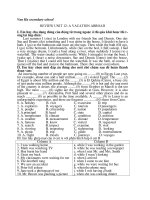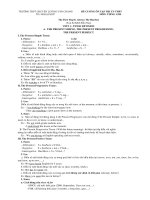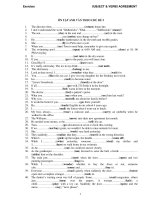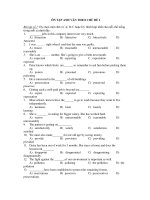ĐỀ ÔN TẬP ANH VĂN KHỐI 12 – ĐỀ 5 potx
Bạn đang xem bản rút gọn của tài liệu. Xem và tải ngay bản đầy đủ của tài liệu tại đây (65.31 KB, 4 trang )
ĐỀ ÔN TẬP ANH VĂN KHỐI 12 – ĐỀ 5
I. Pick out the word that has the underlined part pronounced differently from the
rest
1. a. dear b. hear c. bear d. near
2. a. ought b. groundless c. compound d. announce
3. a. chew b. screw c. crew d. news
4. a. admitted b. deleted c. controlled d. intended
5. a. enthusiasm b. with c. breadth d. think
II. Choose the correct words or phrases
6. On 24th December next year, we _______ in this house for fifteen years.
a. have lived b. will living c. will have lived d. had lived
7. The passengers ran onto the platform but the train _______.
a. go b. has gone c. will have gone d. had gone
8. Nylon, a synthetic _______ from a combination of water, air, and a by-product of coal,
was first introduced in 1938.
a. to make b. make c. made d. making
9. He took _______ the business after his father died.
a. on b. over c. away d. in
10. Some snakes lay eggs, but _______ give birth to live offspring.
a. others b. another c. each other d. the other
11. Boiled meat can be kept in _______ containers.
a. tight-air b. airtight c. airsick d. air-free
12. I remember _______ you before but I am sorry I have forgot your name.
a. to meet b. meet c. met d. meeting
13. There are _______ people learning English nowadays.
a. more and more b. more and less c. more as d. the most
14. Everybody is ready, _______?
a. aren't you b. don't they c. isn't he d. isn't it
15. At seven o'clock yesterday evening, I _______ to the radio suddenly I _______
someone _______ at the door.
a. am listening / hear / knocks b. listened / heard / knocked
c. was listening / heard / knocked d. was listening / heard / knock
III. Complete each sentence with the correct form of the word given in the brackets
16. The rotation of crop prevents soil from _______. (poor)
17. After two _______ attempts, the athlete could manage to pass th bar at the third time.
(succeed)
18. Taxis are often _______ to those who want to travel fast to the station or the airport.
(convenience)
19. The monument is _______. (impress)
20. Forest fire is the most serious _______. (destroy)
21. The acronym UNO comes from United _______ Organization. (nation)
22. Lasers are used as _______ accurate scalpels. (miracle)
23. In spite of his _______, he tried to finish the work. (tire)
24. Peter submitted his final paper on the wrong day because of a _______. (understand)
25. _______ is one of the serious problems in American (employ)
IV. Fill in each numbered blank with ONE suitable word.
Men have been (26) _______ in the stars ever since they first looked (27) _______
into the sky. Some of these stars may have their (28) _______ planets. If (29) _______ is
so, we can suppose that intelligent life may (30) _______ on one of them. The problem is
that the nearest star is four light years (31) _______. In other words, light from it has
been traveling for four years when it finally (32) _______ us. Probably (33) _______
from the earth will ever visit that star (34) _______ it would take a (35) _______ a
hundred thousand years to reach it.
26. a. interest b. interested c. interesting d. interests
27. a. toward b. out c. up d. above
28. a. own b. belong c. possessive d. possess
29. a. who b. whom c. when d. that
30. a. exist b. happen c. appear d. preserve
31. a. on b. near c. away d. from
32. a. comes b. reaches c. goes d. acquires
33. a. nobody b. everybody c. somebody d. anybody
34. a. although b. because c. so d. but
35. a. plan b. helicopter c. fleet d. rocket
V. Read the passage carefully and then answer the questions
In 1965, the United States tried to have one spacecraft get very close to another
spacecraft while in orbit. This was the first step in getting spacecraft to link or dock
together. Docking would be necessary to land men on the Moon. The plan called for a
Gemini spacecraft carrying two astronauts to get close to an unmanned satellite. The
attempt failed. The target satellite exploded as it separated from its main rocket.
America's Space Agency decided to move forward. It would launch the next in its Gemini
series. Then someone had an idea: launching both Geminis. The second one could chase
the first one instead of a satellite. Again, things did not go as planned.
It took two tries to launch the second Gemini. By that time, the first one had been in
orbit for eleven days. Time was right up. The astronauts on the second Gemini moved
their spacecraft into higher orbits. They got closer and closer to the Gemini ahead of
them. They needed to get within 600 meters to be considered successful. After all the
problems on the ground, the events in space went smoothly. The two spacecrafts got
within one-third of a meter of each other. The astronauts had made the operation seem
easy.
In January 1959, the Soviets launched a series of unmanned lunar rockets. The third of
these flights took pictures of the far side of the Moon. This was the side no one on the
Earth had ever seen. The United States planed to explore the Moon with its unmanned
Ranger spacecraft. There were a number of failures before Ranger 7 took pictures of the
Moon. These pictures were made from a distance. The world did not get pictures from the
surface of the Moon until the Soviet’s Lunar 9 landed there in February 1966.
36. The United States tried to have one spacecraft get very close to another spacecraft
while in orbit to __
a. make the flight last longer b. put the two spacecrafts together
c. prepare for men to land on the Moon d. take pictures of the Moon
37. The astronauts were _______ when the Gemini spacecraft got close to an unmanned
satellite.
a. successful b. unsuccessful
c. killed because of explosion d. able to link to the target satellite
38. How close could two Geminis get?
a. 600 kilometers b. 600 meters c. 2 meters d. One-third of
meters
39. The pictures of the far side of the Moon that the Soviet satellite took in January 1959
_______.
a. had not ever been seen before b. were widely known at that time
c. were familiar to everybody at that time d. A and B
40. When did the first spacecraft land on the Moon?
a. In 1959 b. In 1960 c. In 1965 d. In 1966
VI. Rewrite the sentences as directed without changing the original meaning
41. Mrs. Pikes does not work here any more.
No _________________________________________________
42. People have to wait long. They get impatient.
The_________________________________________________
43. Whatever you say, I won't change my mind.
No _________________________________________________
44. People have destroyed forests and they have to suffer from floods.
If only_________________________________________________
45. Tom Cniise is one of my favorite film stars.
Among______________________________________________
46. We have been able to increase our exports very year although we have some
economic difficulties.
No matter____________________________________________
47. The manufacturer spends a lot of money on advertisements. He sells many products.
The more ____________________________________________
48. Don has jogged for two years and now he can run in a marathon race.
After having__________________________________________
49. I expected Daisy to pick me up at the airport.
I expected that ________________________________________
50. We happened to meet John yesterday.
We met`_____________________________________________
VII. Use the given words and phrases to write meaningful sentences. Necessary
changes can be made
51. I / find / dangerous / climb / mountain.
52. travel / long distance / without / rest / make / they / tired.
53. The US / process / change / metric system.
54. time / we / do / something / prevent / forest destruction.
55. cassette recorder / I / buy / yesterday / sound / good.
56. English / pronunciation / difficult / Vietnamese learners / master.
57. citizens / effort / conserve / natural resources.
58. farmers /chemical fertilizers / pesticides / increase / food crops.
59. computer / faster / accurate / than / human.
60. finished film / result / collaboration / individuals.









